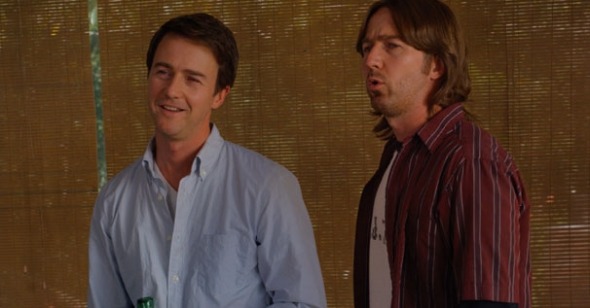The Socratic Problem
By Matt Connolly
Leaves of Grass
Dir. Tim Blake Nelson, U.S., Telepathic Studios
Early in Leaves of Grass, Bill Kincaid (Edward Norton), delivers a lecture praising the Socratic ideas of self-control and rational order. Kincaid is a somewhat stiff academic who claims that a commitment to said principles helped him work his way up from an unpromising adolescence in an Oklahoma backwater to an Ivy League education. Such speechifying is par for the course in writer-director Tim Blake Nelson’s screenplay, which tends to favor intellectual straw men. So, while Norton plays him with a certain brainy charm, we know from minute one that Bill’s theoretical loyalty to a carefully controlled life of the mind is meant to be looked upon with a skeptical, if not dismissive, eye. As with so many professorial types in the movies, his carefully held scholarly ideals need to be largely abandoned so he can accept life’s messiness, let other people in, etc. This is what proves most troubling about Leaves of Grass: Nelson’s simplistic and vaguely anti-intellectual message of embracing life’s “unpredictability.” For a film that sincerely namedrops the great thinkers, such a pat understanding of the human condition puts Leaves of Grass in a state of internal conflict that it never figures out how to resolve.
Bill reluctantly returns to Oklahoma after getting word that his twin brother, Brady (Norton again), has been gunned down in a drug deal gone awry. Upon arriving at his hometown of Little Dixie, however, Bill soon discovers that Brady is alive and well and in need of a favor. A successful local pot dealer, Brady needs to secretly go to Tulsa to visit with Pug Rothbaum (a mewling Richard Dreyfuss), a covert drug lord looking to push him into selling harder stuff. Would Bill act as his double in Little Dixie while Brady goes to Tulsa, so as not to arouse police suspicions? Bill agrees, partly out of guilt for having so long ignored his family (which includes Susan Sarandon as their former wild-child mother) and partly to spend more time with Janet (Keri Russell), a poetess and former academic who ultimately found inspiration closer to home.
Though gimmicky in theory, Norton’s double-dip performance ends up being one of the more refreshingly subtle elements in Leaves of Grass. Norton shades Bill’s assiduously “reasonable” demeanor with shadows of smugness and doubt, and hints at the awkward, lonely boy that Bill was when he finally visits his estranged mother. Brady walks a little closer to caricature in the early scenes, particularly given Norton’s molasses-y Midwestern drawl and slightly bug-eyed delivery of his harebrained schemes. But Brady’s an amiable schemer, and Norton, who too often plays a variation on the guarded sensitive soul, has a ball with Brady’s devil-may-care charm. And despite the inherently showy nature of such a performance, Norton’s work rarely feels too big for the film, making room for other cast members to shine in smaller roles. His scenes with Janet are the loveliest in the movie, with Russell exuding a laid-back, generous sensuality reminiscent of Diane Lane at her most effortlessly charming.
But if Nelson can corral some solid work from a talented cast—he himself does a perfectly serviceable variation on his slack-jawed yokel routine—he quickly begins to lose control of the film once he reaches beyond the fraternal relationship at its center. Leaves of Grass bandies about a host of philosophical concepts, and is not shy about foregrounding the literary touchstones that inspired its creation (the movie’s called Leaves of Grass, for chrissakes). Such references—a pinch of Heidegger here, a dash of Socrates there—can feel pretty scattershot, serving little purpose beyond genial intellectual doodling or, in the aforementioned case of Bill’s Socratic lecture, to inelegantly gesture toward germane thematic points. There are exceptions to this. Bill and Brady bat around ideas about free will versus chance throughout the film’s first half, their opposing worldviews helping to explain their seemingly divergent life paths. And there’s an unexpectedly graceful scene midway through when Brady discusses his concept of God: akin to flawlessly parallel lines, a concept of perfection that human beings can conceive of while simultaneously knowing they will never experience it within the corporeal world.
That Nelson places this dialogue in the mouth of drawling stoner Brady, rather than elite academic Bill, points to the film’s belief in the sophistication of homespun wisdom. But what begins as a useful counterpoint to Bill’s measured braininess quickly begins to resemble a very stacked deck. Bill’s problem, it turns out, is that he just needs to, you know, let go of his rigid bookishness and embrace the craziness of his family’s madcap but dynamic heartland existence. It’s a familiar move, and one that Nelson transparently tries to buffer by having Janet act as a kind of middlewoman between introverted intellectualism and the gregarious—but still insightful!—free-spirited life. Worse, Nelson chooses to illustrate the universe’s boundless irrationality by slopping on some archly gory third-act twists. These reversals echo the work of the Coens in their deadpan switch-ups and cockeyed regional caricature (a Jewish dentist played by Josh Pais provides both questionable comic relief and fairly labored plot advancement). But Nelson doesn’t display the visual brazenness that helps smooth the tonal swerves in the brothers’ comic capers, resulting in gunplay that feels merely unpleasant in its blatant goosing of viewer expectations.
Indeed, one cannot help but feel a little betrayed by Leaves of Grass. Why establish a prickly, interesting brotherly bond, only to swerve away in the film’s closing act to indulge through some what-the-hell violent bumbling? Why call upon some of history’s greatest thinkers, only to offer a do-your-thing shrug as an outlook on life? Ultimately, the film’s mélange of philosophical sound bites and sub-Coen Brothers hijinks bring to mind nothing more than the affable, scatterbrained temperament of an undergraduate pothead: sporadically endearing, but not the kind of person you want to take life lessons from.
